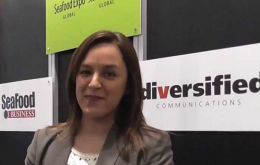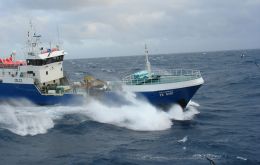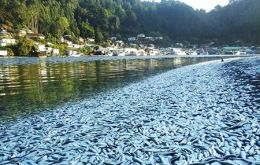MercoPress. South Atlantic News Agency
Fisheries
-
Wednesday, April 27th 2016 - 10:08 UTC
Worlds' largest Seafood Expo opens in Brussels; Falklands attending

Seafood Expo Global and Seafood Processing Global opened doors on Monday to thousands of seafood professionals from all around the world seeking to grow their businesses in the global market. The exposition, which takes place at the Brussels Expo, Belgium, from 26-28 April, is the world’s largest trade fair for the seafood industry.
-
Tuesday, April 26th 2016 - 17:07 UTC
Alarm in Chile's salmon industry: positive reaction to ISA in a farm

Salmon farming company AquaChile reported the detection of a possible ISA virus outbreak in a cage of one of its salmon farming centers located in the Aysen region, in southern Chile.
-
Tuesday, April 26th 2016 - 08:04 UTC
Falklands renews VMS capability contract for tracking over 150 vessels

Big OceanData has been awarded a contract to provide the Government of the Falkland Islands with its vessel monitoring system (VMS) capability for another five years. For the first time the system will include AIS data, which will be integrated with existing Inmarsat tracking data from the fishing vessels.
-
Tuesday, April 19th 2016 - 00:31 UTC
Falklands reports poor catches of squid; reimbursement of licenses to be considered in June

Falkland Islands authorities have confirmed that Illex squid capture has been particularly low this fishing season, a situation that could lead the Islands government to reimburse part of the license fees paid to catch cephalopods.
-
Thursday, April 14th 2016 - 21:08 UTC
Mysterious death of tens of tons of sardines in south Chile; consumption banned

Chile’s government has temporarily banned the consumption of sardines in the south of the country after hundreds of thousands of dead fish turned up floating along the shores of Queule River.
-
Thursday, April 14th 2016 - 09:23 UTC
Chilean company fined by Argentina after admitting operating with Falklands' license

Argentina's Ministry of Agro-Industry has slapped the maximum fine to a Chilean fishing company, firm Empresas de Desarrollo Pesquero de Chile SA (Emdepes SA), a Chilean subsidiary of the Japanese group Nissui for illegal fishing activities in 2014 in Argentina's EEZ, close to the Falkland Islands.
-
Thursday, April 7th 2016 - 09:43 UTC
Indonesia sinks 23 foreign fishing vessels caught poaching, bringing the total to 170

Indonesian authorities sank 23 foreign fishing boats this week saying they were “operating illegally in the archipelago's vast waters in continuation efforts for anti-poaching”, China's Xinhua news agency reported. This brings the number of vessels destroyed by the Government under the policy to more than 170.
-
Friday, April 1st 2016 - 01:30 UTC
Falklands bid farewell to Sea King Helicopters

The Falkland Islands community bid farewell to two Search & Rescue (SAR) helicopters today after over three decades of service. Both the two RAF Sea King helicopters were brought to the capital Stanley today for the local community to say goodbye, as well as meet the crew who man the aircraft. The new AAR helicopter, which will replace the existing RAF SAR service, was also present at the farewell today.
-
Thursday, March 31st 2016 - 08:25 UTC
Chile confirms the loss of 39.000 tons of salmon equivalent to toxic algae

Some 25 million of fish -- equivalent to 39,942 tons of dead biomass -- was the final balance of the emergency caused by algae bloom in 45 farms in the salmon farms of the southern region of Chile, Los Lagos, reported SERNAPESCA, director José Miguel Burgos. A several month’s bloom of toxic algae causes ravage in south Chile salmon and trout farms.
-
Thursday, March 31st 2016 - 00:14 UTC
Beijing reminds Argentina of the jigger sinking before a possible meeting of Macri with Xi Jinping

Beijing said that it “expects Argentina to perform according to law” in reference to the recent sinking of a Chinese flagged jigger by the country's Coast Guard and which was operating in Argentina's EEZ. The announcement is considered significant in Buenos Aires since Argentine president Mauricio Macri is expecting to meet his counterpart Xi Jinping in Washington, next Friday in the framework of the Nuclear security summit.
